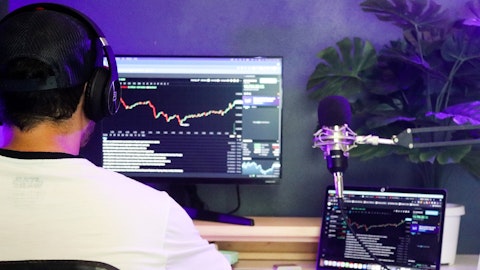In this article, we discuss 10 defensive ETFs to buy before recession. If you want to read about some more defensive ETFs, go directly to 5 Defensive ETFs to Buy Before Recession.
Sometimes, the best offense is a good defense. This is certainly the case at the stock market these days as inflation and rising interest rates wreak havoc with the economy. In addition to inflationary headwinds, the stocks have been further battered by geopolitical tensions in Europe, dragging down the benchmark S&P 500 by more than 10% so far this year and exacerbating fears of an impending recession. The NASDAQ Composite Index, composed of high-growth stocks, is down by over 22% year-to-date as the Fed prepares to raise rates further.
These macroeconomic conditions have increased market volatility and forced investors towards defensive plays. One of the most popular plays have been investments in defensive exchange-traded funds (ETFs). According to data released by financial services firm Morningstar, the net inflows into defensive ETFs have climbed to around $50 billion so far this year, up over $8 billion from the net inflows in defensive ETFs for 2021. The inflows for 2022 are on track to beat the record $75 billion in net inflows into defensive ETFs in 2020 as well.
Some of the sectors that these defensive ETFs have invested in include consumer staples, healthcare, utilities, and real estate. Some of the top stocks in these sectors include The Procter & Gamble Company (NYSE:PG), Berkshire Hathaway Inc. (NYSE:BRK-B), and Costco Wholesale Corporation (NASDAQ:COST). These sectors generally tend to do well during economic crises since consumers pay for basic necessities like food, hospital bills, electricity, and rent before their discretionary purchases in crunch times.
Ryan Jackson, a research analyst of passive funds at Morningstar, told The Wall Street Journal in early May that investors want “safety and security” in the present market and these ETFs offered them a “smooth ride”. Jackson also compared defensive ETFs to “house cats” in his interview, warning that “they’re going to do what you expect most of the time, but they’ll misbehave every once in a while because it is in their nature”. Investments in defensive ETFs are likely to increase in the next few months as the Fed tightens the fiscal noose further.
Our Methodology
The ETFs listed below are discussed with regards to their top holdings. The aim of the article is to provide readers with a basic rundown of some of the top ETFs in the US that have the best chance to provide investors with cover against an impending recession. All the ETFs listed below trade on exchanges in the United States.
Defensive ETFs to Buy Before Recession
10. Invesco Defensive Equity ETF (NYSE:DEF)
Invesco Defensive Equity ETF (NYSE:DEF) is an exchange traded fund that follows the returns of the S&P 500 Index. The fund invests at least 80% of net assets in a subset of firms that are listed on the parent index. The fund has over $284 million in net assets with a yield of 1.31%.
A premier holding of the Invesco Defensive Equity ETF (NYSE:DEF) is Danaher Corporation (NYSE:DHR), a Washington-based conglomerate with interests in professional, medical, industrial, and commercial products and services. At the end of the fourth quarter of 2021, 87 hedge funds in the database of Insider Monkey held stakes worth $7.3 billion in Danaher Corporation (NYSE:DHR), compared to 74 in the previous quarter worth $6.9 billion.
Just like The Procter & Gamble Company (NYSE:PG), Berkshire Hathaway Inc. (NYSE:BRK-B), and Costco Wholesale Corporation (NASDAQ:COST), Danaher Corporation (NYSE:DHR) is one of the stocks that elite investors are eyeing as recession fears gather pace.
In its Q2 2021 investor letter, Cooper Investors, an asset management firm, highlighted a few stocks and Danaher Corporation (NYSE:DHR) was one of them. Here is what the fund said:
“During the quarter the Fund’s largest holding Danaher Corporation (NYSE:DHR) made a notable acquisition, spending US$9bn (~5% of its market cap) to buy privately held Aldevron, a leading player in the fast growing field of genomic medicine. Over the years Danaher Corporation (NYSE:DHR) has built up a unique portfolio of life science and diagnostic assets. Their key life sciences businesses involve providing the tools and services to research, develop and manufacture biotech drugs. For example, they are a key provider to over 400 COVID vaccine and therapeutic projects globally.
Aldevron expands Danaher’s capability into gene therapy. Aldevron is a supplier of key ingredients for the next generation of therapies, namely cell and gene therapy and mRNA vaccines. Aldevron is the leader in these fields and this deal puts Danaher Corporation (NYSE:DHR) in pole position to participate in the wave of innovation occurring in this space.
The acquisition multiple is high – Danaher Corporation (NYSE:DHR) are paying US$9bn for what today is a US$500m revenue business but growing 30% a year with 40% operating margins, in our view justifying the high price. Importantly, management can see an investment return in line with recent acquisitions. As a reminder Danaher’s history and skill set is acquiring businesses, it is how the company has been successfully built over 35 years. The shares were up 4% on the news and have gained nearly 20% for the quarter. Most companies would be sold down off the back of an announcement like this but Danaher has a long multi decade track record of successful acquisitions and this fits a similar enough pattern.
The opportunity is to grow Aldevron into a multibillion dollar business given the growth in genomics and RNA innovation that’s occurring and as more of these types of therapeutics become approved. Overall as a key supplier with deep global networks across life sciences and medical research Danaher Corporation (NYSE:DHR) is very well placed to continue growing with the innovation in biotech and diagnostic markets. It remains an incredibly well run company and a high conviction investment in the Fund.”
9. Vanguard Dividend Appreciation Index Fund ETF Shares (NYSE:VIG)
Vanguard Dividend Appreciation Index Fund ETF Shares (NYSE:VIG) is an exchange traded fund that tracks the investment returns of an index which comprises common stocks of companies that have a record of increasing dividends over time.
One of the top holdings of Vanguard Dividend Appreciation Index Fund ETF Shares (NYSE:VIG) is Johnson & Johnson (NYSE:JNJ), a corporation that makes and sells a range of health-related products globally. At the end of the fourth quarter of 2021, 83 hedge funds in the database of Insider Monkey held stakes worth $7.3 billion in Johnson & Johnson (NYSE:JNJ), compared to 88 in the previous quarter worth $6.8 billion.
8. JPMorgan U.S. Value Factor ETF (NYSE:JVAL)
JPMorgan U.S. Value Factor ETF (NYSE:JVAL) is an exchange traded fund that invests at least 90% of net assets in an index that tracks the performance of companies based on certain value metrics. These metrics include, but are not limited to, attractive valuations, book yield, and dividend yield.
One of the biggest holdings of the JPMorgan U.S. Value Factor ETF (NYSE:JVAL) is UnitedHealth Group Incorporated (NYSE:UNH), a diversified healthcare firm. At the end of the fourth quarter of 2021, 96 hedge funds in the database of Insider Monkey held stakes worth $13.6 billion in UnitedHealth Group Incorporated (NYSE:UNH), compared to 95 in the preceding quarter worth $11.7 billion.
In its Q2 2021 investor letter, ClearBridge Investments, an asset management firm, highlighted a few stocks and UnitedHealth Group Incorporated (NYSE:UNH) was one of them. Here is what the fund said:
“A good way to conceptualize how we think about portfolio construction is to picture a pyramid. At the bottom of the pyramid are the durable compounding growth companies that form the strong foundation, resilience and consistency for the Strategy. We think these companies should comprise just under half of portfolio assets and feature annual revenue growth rates ranging from two times GDP up to 20% as well as healthy free cash flow generation.
UnitedHealth Group Incorporated (NYSE:UNH), a name we have owned in the Strategy since 1992, is a good example of a long-term compounder, having grown its revenue base from approximately $600 million to north of $260 billion over that time frame. It remains constantly focused on investing in new growth drivers such as telemedicine and health care analytics. Broadcom and Comcast have delivered similar long-term appreciation through a combination of organic growth, capital deployment into new and adjacent opportunities through merger and acquisition activity as well as returning capital to shareholders through buybacks and dividends.”
7. iShares Core S&P U.S. Value ETF (NASDAQ:IUSV)
iShares Core S&P U.S. Value ETF (NASDAQ:IUSV) is an exchange traded fund that invests at least 80% of total assets in securities on the S&P 900 Value Index. The index comprises companies that exhibit value characteristics and lie in the large and mid-cap domains.
A flagship holding of the iShares Core S&P U.S. Value ETF (NASDAQ:IUSV) is Exxon Mobil Corporation (NYSE:XOM), an integrated oil and gas firm. At the end of the fourth quarter of 2021, 71 hedge funds in the database of Insider Monkey held stakes worth $5.3 billion in Exxon Mobil Corporation (NYSE:XOM), compared to 64 in the previous quarter worth $4.6 billion.
In its Q4 2021 investor letter, Saturna Capital highlighted a few stocks and Exxon Mobil Corporation (NYSE:XOM) was one of them. Here is what the fund said:
“Few companies maintain their position at the top for more than a decade or two. One that did was Exxon Mobil Corporation (NYSE:XOM), which appeared decennially from 1980 through 2010. In 2019 it was ranked 10th, but as of writing has dropped to 39th place.”
6. Invesco S&P 500 Low Volatility ETF (NYSE:SPLV)
Invesco S&P 500 Low Volatility ETF (NYSE:SPLV) is an exchange traded fund that tracks the investment returns of the S&P 500 Index. The fund only invests in the 100 least volatile companies of the index over the past 12 months as determined by the index provider.
One of the top holdings of Invesco S&P 500 Low Volatility ETF (NYSE:SPLV) is Verizon Communications Inc. (NYSE:VZ), a communications and technology firm. At the end of the fourth quarter of 2021, 63 hedge funds in the database of Insider Monkey held stakes worth $10.8 billion in Verizon Communications Inc. (NYSE:VZ), compared to 57 in the previous quarter worth $10.3 billion.
In addition to The Procter & Gamble Company (NYSE:PG), Berkshire Hathaway Inc. (NYSE:BRK-B), and Costco Wholesale Corporation (NASDAQ:COST), Verizon Communications Inc. (NYSE:VZ) is one of the stocks that hedge funds are buying as inflation continues to soar.
In its Q4 2021 investor letter, Weitz Investment Management, an asset management firm, highlighted a few stocks and Verizon Communications Inc. (NYSE:VZ) was one of them. Here is what the fund said:
“After several quarters of pandemic-induced outsized growth, new broadband connection growth has slowed for U.S. cable operators. This slower growth has coincided with a renewed push by competitors like Verizon Communications Inc. (NYSE:VZ) and AT&T to offer high-speed data (either via wireless connects or by building new fiber-optic networks).”
Click to continue reading and see 5 Defensive ETFs to Buy Before Recession.
Suggested Articles:
- 11 Biotech Stocks Popular On Reddit
- 10 Best Stocks to Buy According to Michael Burry
- 15 Best Penny Stocks to Buy Now
Disclosure. None. 10 Defensive ETFs to Buy Before Recession is originally published on Insider Monkey.






